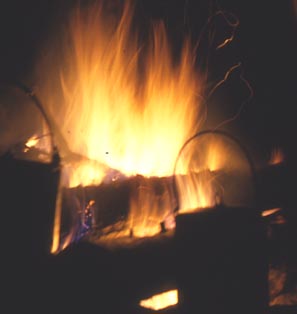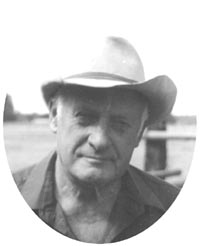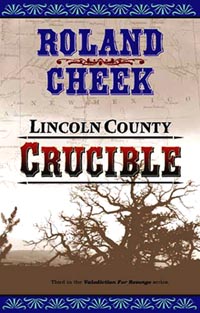a weblog sharing info on outdoor skills and campfire musing by a guy who spends a bunch of time in pursuit of both
CULTURE
WHERE -
TALES ARE TOLD OF
Welcome to Roland Cheek's Weblog
Roland is a gifted writer with a knack for clarifying reality. Looking forward to more of his wisdom
- Carl Hanner e-mail
Aldo Leopold once wrote: For one species to mourn the death of another is a new thing under the sun. The Cro-Magnon who slew the last mammoth thought only of steaks. The sportsman who shot the last [passenger] pigeon thought only of his prowess. The sailor who clubbed the last auk thought of nothing at all. But we, who have lost our pigeons, mourn the loss. Had the funeral been ours, the pigeons would hardly have mourned us. In this fact, rather than in Mr. DuPont's nylons ... lies objective evidence of our superiority over the beasts.
To access Roland's weblog and column archives
Tip o' the Day
There've been a few times when a fire became more than a mere pleasant accompaniment to outdoors adventure -- Like the time I was alone, bringing out the last of our hunting camp on the first day of December. The temperature hovered below zero, and two feet of snow lay across the frozen land. And I lost a mitten.
It was while my packstring trundled silently along the trail. I took the mitten off to dig in my saddlebag for a sandwich. After I'd eaten the sandwich, and wished to slide my already freezing fingers into the fur-line glove, I missed it! My first thought was to stop the packstring and flounder back to look for it. But there were eight laden packhorses back there and I had no idea how long it'd been gone. Besides, it would certainly have been buried by the churning horse hoofs. Later though, a quickly kindled fire from dead fir limbs broken from trees near the trail saved deadened fingers.
Another time a friend and I returned to road's end after backpacking all day in a drenching rain. We reached a three-sided Forest Service shelter well after dark, scrounged what poor wood we could find with a flashlight, then huddled around a fluttering fire that seemed as if it'd never take off. Then I remembered the battered piece of magnesium wedge (used by tree cutters to tip a tree in a desired direction). An old sawyer had told me they sometimes used battered pieces of old wedges to make warming fires burn hot.
Dumb me! I threw the piece of magnesium (not even as large as half a man's billforld) into our fitful fire, then promptly forgot about it while I tried to boil coffee, water for soup, heat campwater for rinsing hands and dishes.
For the uninitiated, magnesium is one of the most difficult metals to weld because its melting temperature and its flashpoint is so close together -- in the neighborhood of 500 degrees. Apparently, some point at the bottom of our little fire, the temperature hovered at 500 degrees.
My friend and I had piled wet wood all around our campfire in hopes it would dry sufficiently to allow us to cook breakfast the following morning. Meanwhile, our coffee water and our soup water and our dishwater barely simmered. Then the magnesium caught!
Instantly the temperature of our fire shot to 2,000 degrees! Flames leaped toward the shelter's shingled roof! Instantly our coffee pot boiled over, the soup pan boiled dry and melted, Luckily I managed to kick the dishpan out into the drumming rain. The wet wood we had scattered around the fire instantly steam-dried, began smoldering, then turned to blaze! My friend and I threw coats over our faces and tried to push the wood out into the rain with long sticks. For a moment we thought we'd lose the building.
Then the magnesium chunk burned out and the flames receded to lick merrily at the charred firewood left in the firepit. Sheepishly we gathered our scattered wood, now all dry, and ricked it along one wall. Then we started cooking all over again.
No, Roland Cheek hasn't been in a gunfight at the O.K. Corral or punched dogies down the streets of Abilene. But he has straddled rawboned ponies over 35 thousand miles of the toughest trails in all the Northern Rockies and spent five decades wandering the wild country throughout the West. Now, after crafting six prior nonfiction books, hundreds of magazine articles, and thousands of newspaper columns and radio scripts about his adventures, the guy has at last turned his talent to Western novels, tales from the heart, dripping with realism, and based in part on a plethora of his own experiences.
* * *
LEAVING OUR KIDS ENOUGH
Critics charge that folks who want to keep a piece of land the way God made it are selfish. They refer to those people as "preservationists" or "protectionists" or "environmental extremists." Some less erudite terms heard are "tree huggers" or "bunny lovers." Those folks are critical of saving something of America for tomorrows; with them, it's patently ridiculous to preserve a mountain or forest or valley for future generations.
To those lampooners, a land is "wasted" if it's not roaded or logged or gouged or strip mined or subdivided or changed from God's handiwork to man's sleight-of-hand. Preservationists, they feel, would keep public land from being utilized for the greatest good for the greatest number. Say what?
The last word in arrogance is the developer who plans to road or log or gouge dollars from the public domain to accuse those who will make nothing by trying to save it as "selfish." There's little use in denying the charge. "Preservationists" are, indeed, trying to preserve, just as "protectionists" protect and "conservationists" conserve. To folks of their ilk, Americans have but two choices with their public lands: develop or preserve. That's the way it's always been.
- Sequoia National Park came to pass as a means to prevent the giant trees from being felled by the axes of Southern Pacific Railroad baron Edward Henry Harriman. Doing combat with him was a little known self-made naturalist named John Muir, who later was instrumental in forming the conservation organization known as the Sierra Club. During the heat of a raging battle, Muir penned these immortal lines:
"I'm richer than Harriman, for I have all the money I want and he hasn't."
- Yellowstone National Park was protected in order to keep the world's foremost geyesers from folks who would claim them in order to turn them into a gigantic private health spa for their own profit. Even then, it took intervention from American Presidents and the U.S. Army to keep market hunters from butchering the Park's wildlife.
- Glacier National Park was established in order to save world-class scenery from the uglification of denuded forests and mine tailings. But in Glacier's case there was a switch from the Sequoia role played by Harriman; another railroad baron--James J. Hill of the Great Northern Railroad was one of Glacier's chief proponents. Hill, of course, wasn't after timber, but passengers; a National Park along his rail line would be a splendid attraction to folks from the east.
Oddly enough, those opposed to the creation of Glacier National Park were local people, local newspapers, the Kalispell Chamber of Commerce, the amalgam of short-sighted folks who feared losing their opportunity to develop the land (at a profit to them, naturally). That Glacier-the-way-God-made-it has already returned millions of dollars more than might've accrued through mining and logging and summer home development is a fact that's conveniently overlooked by today's individuals who automatically oppose saving a free-flowing river, a scenic mountain, a stand of magnificent trees for tomorrow's generations.
Their claim is, of course, that we can save the land without protecting it, but if we judge the future by the past, we've never done so yet. Thus far, the only successful preservation of America's natural treasures have been via designating Wild Rivers, Wildlife Reguges, National Parks, or their late-arriving cousins, National Forest Wildernesses.
To be candidly honest about why we in Montana are fortunate enough to have unclassified, undeveloped tracts of land and lakes is because we're the last remnants of America's original frontier. May God save us, but we've always been farthest away from Broadways and Main Streets. While French cuisine descended on Manhattan and Saratoga Springs, we had all we could do to stay out of the way of buffalo stampedes and grizzly bear charges.
Gertrude Stein once wrote: America is more a place where nobody is than where anybody is. This is what makes America what it is.
I've never lost a moment's sleep because the guts of Centennial Valley is protected by the Red Rock Lake's trumpeter swan nesting habitat, or that a modicum of the Missouri Breaks is protected by the Charles M. Russell National Wildlife Refuge. But wouldn't Montana be a much poorer place if the opposite were true?
That we have so many places in Montana that lie unprotected, yet still the way God made them, is because we're farthest from markets, most difficult to access, and of low viable productivity. Those facts have kept our treasures intact for a century or two, but I doubt if such dependency is in our best long-term interest amid today's mushrooming world.
Maybe it's time to take a harder look at what we have that IS; make certain that what's here remains here for our kids; and perhaps evaluate whether we believe that's enough.
Roland Cheek wrote a syndicated outdoors column (Wild Trails and Tall Tales) for 21 years. The column was carried in 17 daily and weekly newspapers in two states. In addition, he scripted and broadcast a daily radio show (Trails to Outdoor Adventure) that aired on 75 stations from the Atlantic seaboard to the Pacific Ocean. He's also written upwards of 200 magazine articles and 12 fiction and nonfiction books. For more on Roland, visit:
www.rolandcheek.com
Recent Weblogs
Tuesday, January 1, 2008
for more info about these and other Roland Cheek books
There's a bunch of specific info about Roland's books, columns, archives and radio programs. By clicking on the button to the left, one can see Roland's synopsis of each book, read reviews, and even access the first chapter of each of his titles. With Roland's books, there's no reason to buy a "pig in a poke."
for detailed info about each of Roland's books
Read Reviews
Read their first chapters
For interested educators, this weblog is especially applicable for use in history, outdoor/nature and journalism classes.
Roland, of course, visits schools. For more information on his program alternatives, go to:
NEXT WEEK:
LEVELING THE PLAYING FIELD
www.campfireculture.com
Award-winning Western writer Richard Wheeler says of Roland's novels:
Like Louis L'Amour, Roland Cheek knows how to start a story at a gallop and hold the reader to the last page. he writes richly and authentically about the Old West, drawing from an encyclopedic knowledge of his subject.
1st in series
2nd in series
3rd in series
4th in series
5th in series
6th in series
to send this weblog to a friend
to tell Roland what you think of his Campfire Culture weblog
to visit Roland's newspaper columns and weblog archives
source links for additional info








